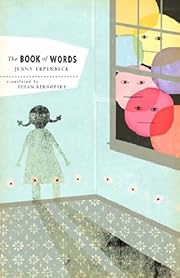

Klicka på en bild för att gå till Google Book Search.
|
Laddar... Ordbokav Jenny Erpenbeck
 Ingen/inga Det finns inga diskussioner på LibraryThing om den här boken. Criada por una nodriza que le cuenta la leyenda de la Difunta Correa, con una madre distante y un padre idealizado, la niña que protagoniza la pureza de las palabras, crece en un pequeño mundo, protegido y en apariencia virtuoso. Sin embargo, la ciudad en la que vive es cada vez mas oscura, desprovista de alegría. I loved this book, it is best read in one sitting. My mind loves to wander the way Erpenbeck writes though I fear even attempting to pin down my thoughts in this manner. This book is dark and vague at times, not for the reader who demands that everything "make sense" at all times and likes things spelt out for them. Words cascade through the young girl at heart of this brief but dense novella. They shimmer. They sparkle. They circle round and round a truth that she can’t quite reach. She has a taciturn father, a well-manicured mother, a wet-nurse, all in a very large but mostly empty house in a land where the sun shines hot every day and there is no snow. She is endlessly fascinated by the world around her, but forever unable to piece together the picture that has so many pieces missing. People literally go missing. Some are pulled off buses by their hair. Others just “go on vacation” but never return. That is, until they do start returning to visit her in the form of insubstantial spirits. Somehow, the girl knows, her father is in some way responsible for these disappearances. But it all seems a blur. This is a fascinating, macabre, approach to the limitless destructive power of a state and the men who wield that power. At times you just have to let Erpenbeck’s words wash over you like waves on a shore, as she visits and revisits particular phrases and telling images. The effect is haunting. As much tone poem as narrative. Recommended. Words are powerful, though you’d not know it from the bulk of novels written. As the title of this short novel, perhaps even a novella, shows, its story is about words and their uses and the way in which they can create a world for a protagonist and hint to the reader at the context for that world. The narrator discusses words as she describes her childhood in an unnamed country suffering under an oppressive regime, and in which her father works. It’s a completely self-centre narrative, as every word in the book is about the narrator or her world. But what she writes does provide clues to the reality underlying the narrative. The mother is German, and had fled her country for political reasons – mostl likely because she was a Nazi. Though the Germans have contributed to the father’s country, they are not liked. The regime is brutal – the father talks openly about torture, and even describes atrocities committed by some unnamed Germans (one of which is clearly Mengele). The Book of the Words is closer to The Old Child than it is Visitation or The End of Days. It’s not an easy read – and in parts, it is quite gruesome – but it is very clever in the way it doles out information to the reader, aithout breaking the narrator’s character. Erpenbeck has to date published six books, although, I think, only four have been translated into English. My German is probably too rusty to fully appreciate her prose in that language. So can someone publish those other two books in English, please?
Reflecting back on her girlhood in an unnamed and repressive society, the narrator examines how periods of censure facilitate the unreliability of language. As the title suggests, the materiality of words is of interest to both the narrator, trying to make sense of the obfuscations that enfolded her youth, and to the author, a German whose style further ratifies the evergreen resources of modernism.
Written in sharp and sinister prose, this is a novel in which beauty and cruelty are never far apart. 'The Book of Words' is the follow-up to 'The Old Child'. Inga biblioteksbeskrivningar kunde hittas. |
Pågående diskussionerIngen/ingaPopulära omslag
 Google Books — Laddar... Google Books — Laddar...GenrerInga genrer Melvil Decimal System (DDC)401.4Language Language Philosophy and theory Communication; semantics, pragmatics, languages for special purposesKlassifikation enligt LCBetygMedelbetyg: (3.38) (3.38)
Är det här du? |
|||||||||||||||||||||||||||||||||||||||||||||||||||||||||||||||||||||||||||||||||||||||||||||||||||||||||||||||||||||||||||
As this translation seemed jumbled, I feel ill-equipped to comment on the content of the novel. I was in favor of the abrasively serialized imagery, however, and found the narrator quite believably young. The Book of Words was a compelling story, but could perhaps benefit from another translation.
(